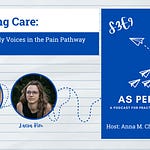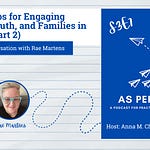Meet our guest listener
Kathy Smith: Kathy Smith is a cancer survivor and a cancer care partner actively engaged as a co-author in many healthcare research projects - including Anna M. Chudyk’s work on better understanding patient partners’ perspectives on engagement and exploring future directions for Canadian patient-oriented research. She is a patient research/awards reviewer for many organizations including the Canadian Cancer Society.
Episode Transcript:
Anna:
Hi everyone! Welcome back to onePERspective. A tri-weekly segment in which patient partner Kathy Smith shares a synopsis and key reflections from the previous week’s episode of asPERusual – a podcast for practical patient engagement. Today, Kathy Smith will be discussing the episode in which Annie LeBlanc and Yvonne Pelling came to talk about the Strategy for Patient-Oriented Research National Training Entity Passerelle, or NTE as its known for short. The Strategy for Patient-Oriented Research, also known as SPOR for short, is a national coalition that was created by Canada’s major public funder of health research, the Canadian Institutes of Health Research, to champion and support patient-oriented research. As a reminder, patient-oriented research focuses on patient and public identified priorities and outcomes and engages patients and the public as members of the research team (which is referred to in Canada as patient engagement in research). The NTE is a network of networks that was funded by SPOR to increase capacity for patient engagement and patient oriented research. You might want to check out our website, asperusual.substack.com, if you want help keeping all of those details straight. Ok. Enough from me. I’ll turn it over to you Kathy for your onePERspective.
Kathy Smith:
Thanks, Anna. Here's another enlightening episode for anyone interested in engaging in patient oriented research. In my last personally speaking, I asked our listeners to consider dreaming big for a pan-Canadian network of networks. Et voila!! Voici! Here it is! SPOR has already got that started. SPOR? SPOR is the Strategy for Patient-Oriented Research. Members Yvonne and Annie enthusiastically enlightened us about the potential of SPOR’s National Network of Networks they call the National Training Entity (NTE).
Yvonne and Annie tell us NTE aims to build capacity by gathering all POR and PER lessons learned to create training courses and mentoring activities that help make connections to empower patients and researchers alike. Training and mentoring tools are to be developed for managers and funders as well. How? They describe NTE as building “little bridges” (or “passerelles” en francais) that can perform as connectors, catalysts, and facilitators to build PER4POR capacity. PER — patients engaged in research — for POR — patient oriented research. The network of networks can be used by patients wishing to engage in research (known as PEiRs). Researchers wishing to know more about patient-oriented research or to find PEiRs to help in their research can gain access through the passerelles as well.
NTE’s mandate is to connect its user to the right training in the right context for the right person in the right setting, at the right time. Moreover, NTE’s passerelles facilitate connections. The NTE aims to short circuit connecting the right research engagement need to the right PEiRs to fill the need. I'm hoping that all these national capacity building connections, these passerelles (I like that word a lot) will help to transform the traditional research landscape into a much warmer, safe space, an equitable patient engaged in research environment that facilitates PER 4 POR: Patients Engaged in Research for Patient-Oriented Research.
Key messages
For me, the three key messages gleaned from Yvonne and Annie’s SPOR-NTE presentation are:
Know yourself and be clear in articulating what you can contribute to the research. Shakespeare told us centuries ago: “To thine own self be true.” Bring your authentic self when partnering in research. Academic knowledge is always enriched and enlightened when the research is grounded and relevant and bridged with the authenticity of real world experiences.
Interdisciplinary collaboration: More and more and more in the 21st century, we're going to see this as the norm for conducting research. We can all benefit from training to join forces and to engage collaboratively in patient-oriented research.
Critical thinking skills and creativity are not the exclusive realm of the academic experts. Amalgamating lived experience expertise into the PER4POR research landscape will move us beyond the traditional ways of thinking about and conducting research in separate silos. Patients, researchers, clinicians and policymakers can build capacity and research with, by, and for patient partners with access to this powerful pan-Canadian SPOR NTE support.
Personally speaking, points to ponder
Yvonne and Annie, like all the other podcasters before, have told us how to successfully interact. Bring your authentic self. Be open minded. Keep calm and steady and results-focused. Attitude is everything. Attitude, not aptitude, determines altitude.
Interdisciplinary, interprofessional and inclusive research is becoming the modus operandi for the 21st century. Are we able to build equitable partnerships or do we need some extra training? Building relationships seems to be the secret sauce for successful patient engagement in research. Will the NTE be able to equip the different stakeholders with effective collaborative communication skills? As of today, SPOR’s ambitious pan-Canadian Network of Networks National Training Entity is just a repository of PER4POR resources and tools. I dream of growing the training entity to include POR navigators charged with managing all PER4POR activities. A navigator passerelle will be of an enormous bridging benefit to all POR stakeholders. What is needed next for NTE to hire navigators to train, to connect, and to mentor patient partners engaged in research and the researchers wanting to engage them? How can we encourage research, public, and private funders to financially support a navigator agency? How can we show them this agency would decrease time and increase the efficiency for researchers burdened with these added PER4POR tasks right now?
Anna:
Thanks so much Kathy! You always manage to distill episodes so nicely. I know that a major component of engagement is interpersonal connection, but I wonder if there’s some role for artificial intelligence to help make your navigator idea a large scale reality? Otherwise, or maybe in tandem, I think that a peer-to-peer individual or group buddy system could also help make your idea a sustainable one. Lots to think about, which is one of the many reasons I love your segment. Thanks so much for inspiring it and always making time for it.
I’ll be back in 2 weeks, so on April 22, with season 2 episode 6 of asPERusual. On it I will be talking with Tracy McQuire and Linxi Mytkolli from Diabetes Action Canada, a SPOR network focused on bringing patients, their caregivers, and researchers together to identify the health concerns of those living with diabetes and to co-create research projects that address these concerns. If you’re looking for something to keep your patient engagement in research juices flowing until then, I’ve got just the thing for you. Our friends and colleagues at the Patient Advisors Network have just released a report titled, Reimagining the Research Landscape. In this report, they offer insights from 262 patient and caregiver partners about how CIHR/SPOR can foster and provide support at all levels to better support patients and caregivers in partnering in research. When you’re really inspired after reading this report, consider checking out a study by my colleagues and I that applied a participatory process to investigate future directions for Canadian patient engagement in research. Its titled “Future directions for patient engagement in research: a participatory workshop with Canadian patient partners and academic researchers” and free to everyone to read in a journal called BMC Health Research Policy and Systems.
Until next time, please be sure to check out our website (asperusual.substack.com) for resources from today's episode, and an interactive transcript from this and previous episodes. Please also remember to subscribe to this podcast through our website or wherever it is that you download your podcast episodes. While you’re there, if you take the time to leave us a positive review, it will help others find the podcast as well. Lastly, for those of you who'd like to contact me, please shoot me an email at anna.asperusual@gmail.com. Thanks so much for tuning in! Have a great couple of weeks! And until next time, let's keep working together to make patient engagement in research the standard or As PER Usual.












